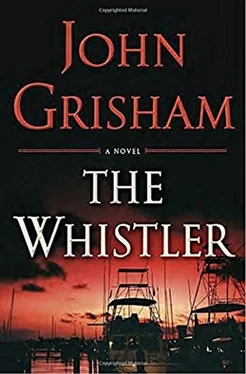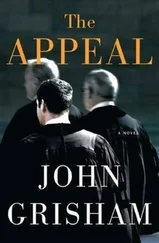As agreed, Wilton met her near the front entrance and they found a quiet table in a coffee bar at the edge of the lobby. For his trip to the big city he was dressed exactly as he had been when they met him under his shade tree a few weeks ago. It seemed like a year. Denim from head to toe, beads around his neck and wrists, long hair pulled back into a ponytail. She was reminded of how much he favored his brother. As they waited for their coffee he passed along his sincere sorrow about Hugo, a man he had liked. He asked about her injuries and said she looked great.
“How much do you know about the accident?” she asked. “What’s the buzz on the street?”
His words were just as slow in town as they had been on the reservation. The man was perpetually calm. “Lots of suspicions,” he said.
A waitress placed the cups before them-dark roast for Wilton, a latte for Lacy. After a long pause, she said, “Okay, I’m listening.”
“The name Todd Short ring a bell?” he asked.
“Maybe, I guess, somewhere. Help me out.”
“He was one of the two jailhouse snitches who testified against my brother. At different times before the trial, the cops placed each snitch in Junior’s cell, then pulled them out after a day or two. Both lied to the jury and said Junior bragged about killing the sonofabitch he caught with his wife. And for good measure he killed her too. It was very effective testimony and it nailed Junior.”
Lacy sipped her latte and nodded. She had nothing to add and she refused to drag it out of him. He had arranged this meeting.
“Anyway, not long after the trial, Todd Short disappeared. So did the other snitch, a punk named Robles. Years passed and everybody assumed the two had been rubbed out, probably by the same people who killed Son and Eileen. Now, fifteen years later, Short has resurfaced and we have spoken.”
A pause as more coffee was consumed. Lacy was about to ask, “Are you going to tell me what he said?” Wilton glanced around casually, cleared his throat, and said, “I met him three days ago, off the reservation. When I saw him I remembered how much I hated him. I wanted to smash his face with a rock, but we were in a public place, some kind of fried chicken joint. He starts off by saying he’s sorry and all that crap. He was a drifter with a drug habit and a criminal record and his life was going nowhere. He didn’t know Robles very well but he got word not long after the trial that the punk had probably been killed, so he took off. Went to California, where he’s been living under a rock ever since. Actually, he cleaned up his act and has had a decent life. Now he’s dying of cancer and wants to make nice, wants to bare his soul and confess his sins.”
“Which are?”
“Back then he was in jail in Sterling facing another drug charge, one that would get him locked up for years. He’d seen prison, didn’t want to go back, so he was easy bait for the cops. They offered the deal. The prosecutor agreed to let him plead to something ridiculous, and after a few weeks in the county jail he’d be a free man. All he had to do was spend a couple of days in the cell with Junior, then testify at trial. I was in the courtroom and saw it all. Short was a great witness, very believable, and the jury ate up every word of his testimony. It was irresistible. Who doesn’t like a good story about illicit sex? According to him, Junior enjoyed telling how he came home early, heard noises from the bedroom, realized what was happening, got his handgun, kicked open the bedroom door, and there was his wife and Son Razko going at it on the bed. In a rage, he shot Son twice in the head, and when Eileen wouldn’t stop screaming he shot her too. Then, and this has never made sense, he took Son’s wallet and fled the scene. All bullshit, of course, but Short sold the story to the jury. To claim it was an act of passion, an irresistible impulse, would have been to admit to the killings. Since Junior had nothing to do with it, he couldn’t use the obvious defense. As I’ve said, he had a bad lawyer.”
“Did Short get cash?”
“Two thousand dollars, handed to him by a cop after he testified. He hung around the area for a few weeks, until he heard the rumors about Robles. Then he fled.”
Lacy’s phone was on the table, muted. It vibrated and she glanced at it.
“Why did you change phone numbers?” Wilton asked.
“These are state-issued phones. My old one was stolen from my car just after the accident. My new one has a different number.”
“Who took it?”
“Probably the same people who caused the wreck. So what does Short want to do now?”
“He wants to tell his story to someone who’ll listen. He lied, and the cops and prosecutor knew he was lying, and he feels terrible about it.”
“A real hero,” Lacy said as she took another sip of her latte and looked across the busy lobby. No one was watching or listening, but these days she couldn’t help but notice people. “Look, Wilton, this could be a big break, but this is not my case, okay? Junior’s appeals have been handled by those guys in D.C. and he’s lucky to have such fine lawyers. You need to sit down with them and let them decide what to do with Todd Short.”
“I’ve called them a couple of times but they’re too busy. Not a word. Junior’s last habeas appeal was turned down eight days ago. We expect he’ll get an execution date pretty soon. His lawyers have put up a good fight, but we’re at the end of the road.”
“Have you told Junior?”
“I’ll see him tomorrow. He’ll want to know what will happen now that one of the snitches is recanting. He trusts you, Lacy, and I do too.”
“Thanks, but I’m not a criminal defense lawyer and I have no idea if any of this is relevant after fifteen years. There are limitations on bringing up new evidence, but I don’t know the law. If you’re looking for advice, I’m the wrong person, the wrong lawyer. I would help if I could, but this is way out of my league.”
“Could you talk to his lawyers in D.C.? I can’t get through.”
“Why can’t Junior talk to them?”
“He says somebody is always listening in prison. He thinks the phones are tapped. And he hasn’t seen the D.C. lawyers in a long time. He thinks they might be forgetting about him now that the end is in sight.”
“I disagree. If a snitch appears with a different story and swears under oath that the cops and prosecutor knew he was lying, and he got paid cash, believe me the D.C. lawyers will be excited.”
“So you think there’s hope?”
“I don’t know what to think, Wilton. Again, this is not my field.”
He smiled and went silent. A rodeo team in matching boots and Stetsons paraded through the lobby, their identical roller bags whining in a dull chorus. When they were finally gone and the racket was over, he asked, “Have you met Lyman Gritt, the ex-constable?”
“No. I hear he’s been replaced. Why?”
“He’s a good man.”
“I’m sure he is. And why bring up his name?”
“He might know something.”
“Do you know what he might know, Wilton? Don’t play games with me.”
“No, I don’t. He got fired by the Chief. They are at odds. His firing came just days after your accident. There are a lot of rumors, Lacy. The tribe is uneasy. A black guy and a white girl were on the reservation at midnight, digging around for something. He ends up dead under suspicious circumstances.”
“Is his being black suspicious?”
“Not really. We’re not hung up on skin color. But you have to admit it was unusual. It has been the general belief for a long time that bad people were behind the casino, in bed with our so-called leaders. Now, finally, it might be unraveling. Someone, you and Hugo, dared to show up and start asking questions. He met a tragic end. You came close. The investigation is getting buried by our new constable, who’s not trustworthy. Lots of rumors and speculation, Lacy. And now, from nowhere, Todd Short sneaks into the picture again with a different story. It’s unsettling, to say the least.”
Читать дальше












